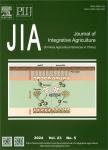How Could Agricultural Land Systems Contribute to Raise Food Production Under Global Change?
How Could Agricultural Land Systems Contribute to Raise Food Production Under Global Change?作者机构:Key Laboratory of Agri-Informatics Ministry of Agriculture/Institute of Agricultural Resources and Regional Planning Chinese Academy of Agricultural Sciences Institute for Environmental Studies VU University Amsterdam Amsterdam De Boelelaan 1087 The Netherlands International Food Policy Research Institute Washington D.C. 20006 USA
出 版 物:《Journal of Integrative Agriculture》 (农业科学学报(英文版))
年 卷 期:2014年第13卷第7期
页 面:1432-1442页
核心收录:
学科分类:120301[管理学-农业经济管理] 12[管理学] 083001[工学-环境科学] 1203[管理学-农林经济管理] 0830[工学-环境科学与工程(可授工学、理学、农学学位)] 08[工学]
基 金:supported and financed by the National Basic Research Program of China(973 Program,2010CB951504) the National Natural Science Foundation of China(41271112) the National Non-Profit Institute Research Grant of Chinese Academy of Agricultural Sciences,China(IARRP-2014-2)
主 题:agricultural land systems food production expansion allocation intensification global change
摘 要:To feed the increasing world population, more food needs to be produced from agricultural land systems. Solutions to produce more food with fewer resources while minimizing adverse environmental and ecological consequences require sustainable agricultural land use practices as supplementary to advanced biotechnology and agronomy. This review paper, from a land system perspective, systematically proposed and analyzed three interactive strategies that could possibly raise future food production under global change. By reviewing the current literatures, we suggest that cropland expansion is less possible amid iferce land competition, and it is likely to do less in increasing food production. Moreover, properly allocating crops in space and time is a practical way to ensure food production. Climate change, dietary shifts, and other socio-economic drivers, which would shape the demand and supply side of food systems, should be taken into consideration during the decision-making on rational land management in respect of sustainable crop choice and allocation. And ifnally, crop-speciifc agricultural intensiifcation would play a bigger role in raising future food production either by increasing the yield per unit area of individual crops or by increasing the number of crops sown on a particular area of land. Yet, only when it is done sustainably is this a much more effective strategy to maximize food production by closing yield and harvest gaps.



